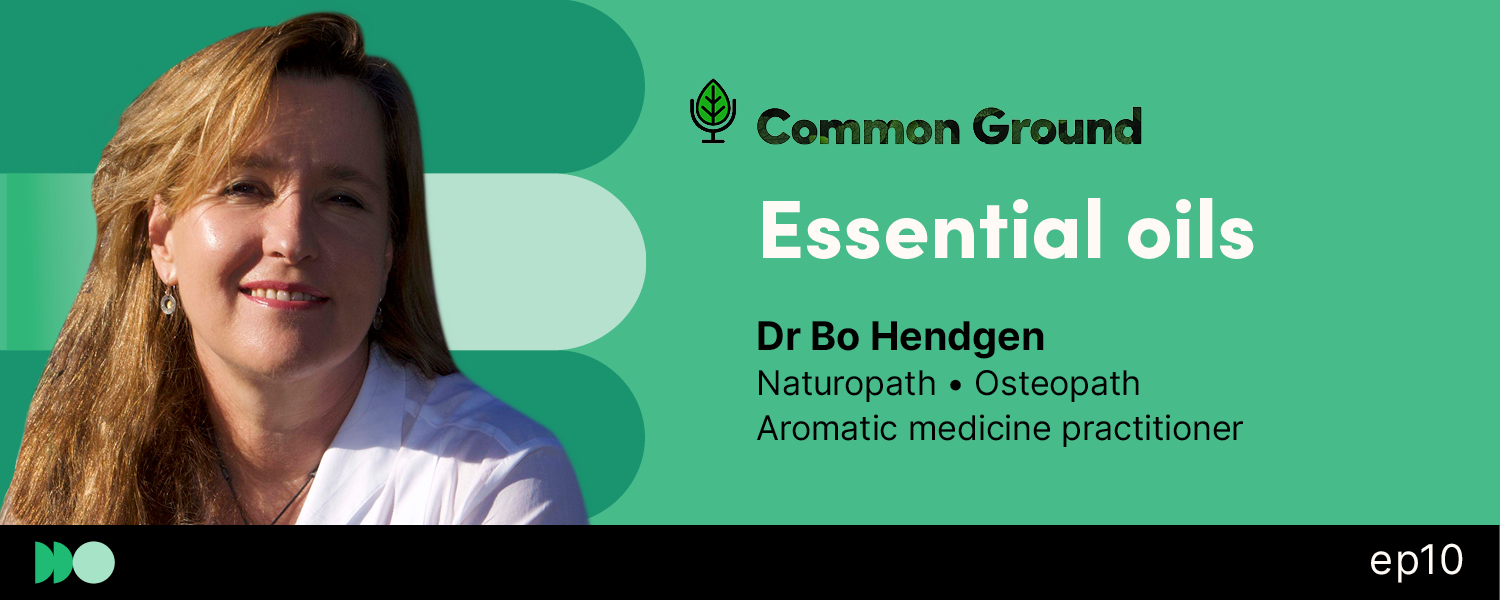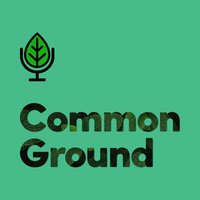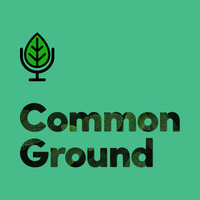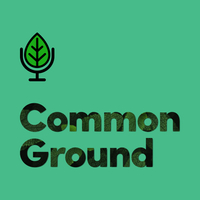
Listen on Amazon music | Apple Podcasts | Google Podcast | Spotify
Transcript:
Jacqui Fahey (0:03):
Welcome to Common Ground, a podcast series discussing new research and interesting projects in the field of complementary medicine. Hello, my name is Jacqui Fahey, Head of Education at vital.ly.
vital.ly is a digital platform, a professional health resource and a distribution service all in one.
Firstly, I’d like to begin by acknowledging the Gadigal people of the Eora nation as the traditional custodians on the land on which we gather here. I would also like to pay my respect to their elders both past and present.
Essential oils (EOs) are one of the most important natural products derived from plants for their various biological properties and medicinal uses (1).
Plant essential oils have been used as medicine for centuries by many cultures around the world and have demonstrated several health benefits, including effects on infectious, chronic, and acute diseases (2). EOs have been utilised in different domestic aspects such as in perfumery, cosmetics, feed, food, beverages and therapeutically for aromatherapy purposes.
The first records of EOs come from ancient Egypt some 4500BC as well as from India and Persia for use in cosmetics and as ointments. cosmetics and ointments (3,4). Essential oils come from various species of flowers, grasses, fruits, leaves and trees. They are found in the secretory system of plants (in other words, the bark, seeds, leaves, petals, stems and roots).
There are a spectrum of oils available for sale on the market. So what makes an essential oil therapeutic? Not all are created equally and this depends upon many aspects from sourcing of the plant, extraction methods used, and then the intended application method for using the essential oil.
For example, why can you get headaches when using some essential oils over others? For dispersing essential oils, what are the key things one looks out for when using an oil diffuser, as many are made from plastic.
So the quality of the oil matters, along with application method for the individual.
Today on Common Ground, Bo Hendgen shares her training and experience working with essential oils and their various clinical applications. Bo is a Naturopath, Osteopath and Aromatic medicine practitioner. 38 years ago, Bo studied Aromatic medicine in France and then a few years later, ventured to New Zealand with two young children (a 3 year old and a 3 month old), a backpack and $50 in her pocket. While setting up her holistic healthcare practice, Bo struggled to find the level of quality essential oils for her practice that she’d been used to dealing with in France. So she decided to source her own – and Absolute Essential was born.
Welcome to Common Ground Bo.....
Dr Bo Hendgen (3:03):
Thanks for having me.
Jacqui Fahey (3:05):
I know I touched on it briefly in the introduction here, So what are essential oils Bo including some of their benefits ?
Dr Bo Hendgen (3:13):
Essential oils, if you wanted a clear definition, are the volatile compounds of plants, so they are actually the difference between a herbal extract and an essential oil is that there are molecules which are volatile. So if you keep the bottle open, they disappear, whereas with a tincture, of course, that wouldn't happen or with a carrier oil it wouldn't happen. So we've got volatile molecules which can actually enter the body into a different pathways. Now, the benefits of this from a clinical perspective is that there's very little interference with nutritional supplements or even medication because they're entering through the olfactory system and through the epidermis, if they're the right quality, rather than through the digestive system.
Jacqui Fahey (4:11):
So there are different ways to extract essential oils depending upon what the application is used for, yeh?
Dr Bo Hendgen (4:16):
94 to 96% of the world, production of essential oils are done for the flavour and fragrance industry. So that's a lot and now when you're thinking about the flavour and fragrance industry, you're thinking about flavour, meaning citral acid out of lemongrass might be added to muesli or to jam, to make it taste nice and lemongrass might also be extracted for body washers, shampoo.
You know, it's a pleasant smell, then there's four to six percent off essential oils which are extracted for the medicinal purpose and that intent is essentially established on the harvest on how it's grown and then also how it's extracted, how it's handled.
Jacqui Fahey (5:06):
Bo, what makes an essential oil therapeutic?
Dr Bo Hendgen (5:11):
When you're having a medicinal essential oils, a therapeutic one, as I said before, the intent is completely different. So our lemongrass comes from the Southern Nepal and it is organically grown. It is an, a very small sort of still, which is actually fired by the dried lemon grass from the previous extraction because the wood, it is very, it's very sustainable, so the wood is extremely rare in this and valuable. It's 80 to 120 degrees it takes like the, the flavour and fragrance one took 15 minutes, this one takes eight to twelve hours.
And so the selection of molecules, like one, you get like maybe 10 or 15 molecules for the flavour and fragrance one versus lemon grass has around 80 to a hundred molecules. And it starts little tiny molecules, which I actually think if you're looking at a gas chromatogram, you can see it. It's those little tiny molecules, which make the, create the magic, the healing, the, you know, because it's done with that intent.
Jacqui Fahey ( 6:22):
It makes sense then when you have this larger number of molecules from a longer slow cook method for the essential oils as opposed to a fast extraction like seen for the flavour industry.....so what is the correct dilution when administering essential oils topically?
Dr Bo Hendgen (6:43):
With essential oils you've got an incredible selection of different application methods. So for some people that is actually quite confusing, it's very important to choose a specific application for a specific purpose to have the optimum effect. This is where the application method, respiratory conditions from the upper respiratory are best effected by inhalation. There's no question about that.
If you have a stress condition, for example, if you, if you feel stressed, then I think it would be a good way of either diffusing the blend, or you can put it on some pulse points. So that's a more subtle, slow absorption of the application.
Dr Bo Hendgen (7:40):
But let's say for example, if you've got back pain, if you are applying a compress to your lower back, you have fabulous effect. However, the dosage for this, if especially if it's therapeutic, then you would be able to apply 25 drops of peppermint for back pain rather than in a compress in a hot compress, rather than just, I mean, inhaling, it wouldn't give you as much pain relief. So, you know, there is just, it's really important to be very specific in regards to what you want to use it for and what your condition is. And then on top of that, of course, it comes into a kind who, who you are, are you a pregnant woman? Are you a child? Are you elderly? Are you on lots of medication? So these elements will really affect again, the effectiveness of that prescription.
Jacqui Fahey (8:40):
What are key considerations when maximising therapeutic value from a plant?
Dr Bo Hendgen (8:42):
The molecules are small enough, so it's all about the size of the molecules in the flavour and fragrance, hot and fast extraction method, the molecules are quite crude and quite large, so they bounce of our olfactory and they also bounce off the skin. They can cause headaches, they can cause nauseating feeling or cause rashes. So that's a contraindication of a commercially extracted essential oil which wasn't done for the purpose of a therapeutic application.
Jacqui Fahey (9:22):
Thank you for explaining that, yes I have experienced headaches and some nausea from certain essential oils, so thank you for clarifying that.
What is your professional opinion on ingesting essential oils? Format would matter like encapsulation but you do hear concerning cases where people try essential oil drops straight into their mouth without diluting.
Dr Bo Hendgen (9:47):
I think before I answer that question, I just want to reestablish that I was trained in France, in Aromatic medicine, and in France the use of essential oils, is like, we use them everywhere we can. we use them internally, we use them in suppositories, we use them in pessaries, we make, you know, ear drops and so on and so on. So, and they're also used internally.
So I think the first thing, which the practitioner needs to be very clear, that the quality of the oil which they want to administer needs to be therapeutic and medicinal. Now it's a little confusing because a lot of people are using those terms. Secondly, I think it is very important to make sure that it's from a specific botanical species.
Dr Bo Hendgen (10:41):
So lavender angustifolia, lavender tulis. The third thing is very important that the plant part which is extracted as specified on the bottle, so you should have an English name, you should have a latin name, you should have the plant part on there because you get a very different quality essential oil. Let's say from, take lavender, if you extracting the purple bit, well, you know, in the stems, which should be extracted rather than cutting the whole plant with the green leafs, will give you a complete different quality oils and essential oils have very, a variety of pricing as we know.
So thirdly, rather fourthly, the other thing which is very important is the country of origin. I like you to consider essential oils are unique in the natural health world of products and the pathway is unique. So do we really need an essential oil to be internally or to be ingested when it's got the ability to actually enter the body through the olfactory and the epidermis? So it's got an incredible value as a companion product to help with the other, without interfering, you know, worse our digestive system. However, saying that, this would be very good for your sinus problems or for any respiratory problems like coughs, be very good for any issues with the endocrine system, with hormones, with the nervous system, anxiety, you know, you all those that's perfect. However, if you've got parasites for example, or if you've got which you know, and Crohn's disease or inflammation in the stomach, essential oils absorbed or swallowed will be very effective on the digestive system.
Dr Bo Hendgen (12:47):
What, what often is not taught very well, is the, how an essential oil needs to be combined to be safe. So, first of all, you don't, you want to establish that the person doesn't, hasn't got isn't super sensitive, hasn't got any allergies. I wouldn't recommend it clearly for pregnant woman, not for children. Neither would I recommend it for elderly people. So it's just be very careful whom you're prescribing this to, secondly, what's the medium you're going to put it in. An essential oil is not greasy but it's more like an oil than water. So the only essential oils which I recommend to be taken in water is citrus oils because there should be cold pressed and they're coming from the rind. So it's a different extraction methods and put a drop into a little bottle of lemon one drop of lemon oil and litre bottle of water, really freshens up this, and it's on one litre and you sip of wired it during the day makes you feel good. You know, it's lovely.
Jacqui Fahey (13:59):
When using essential oils in an oil burner, does the quality of the oil matter?
Dr Bo Hendgen (14:06):
We don't refer to burners as such because when we are burning something, it's usually, it's destroying things. Yeah. So we are, we are used the terminology either diffuser or diffusing. So it's the essential oil important. Absolutely. When we're diffusing something, the molecules gets absorbed, you know, everybody, first of all, is everybody in the environment will actually breathe these molecules into the body and if you think about how they enter the body, so ,when you take a breath, you cannot take a breath without smelling. So you, the molecules would travel with the breath and into the olfactory system and into your brain. Secondly, of course, with the breath that also goes into your lungs and you absorb them into your bloodstream, through the lungs. It's much more important when the person is not of optimum health, to make sure that it's ideally organic wild ground and therapeutic quality of an essential oil. Be aware that they shouldn't have any plastics, because now they're doing some studies that essential oils are strong, and I don't know, what if you had to eucalyptus and you've got some varnish on your windows, it would dissolve them.
Dr Bo Hendgen (15:31):
You know, so it's just, you have to think about what it does to plastics and especially some of those extremely cheap diffusers, which are coming in from China. The plastic gets dissolved within six months and it gets all gooey. So you, you sort of like chewing gum. It’s just like gooey. And those molecules, now they're doing some studies actually in Canada and in the UK, that those molecules will attach themselves to the steam or the essential oils. And there are a compound of them will be absorbed into the brain and not a good thing. And I actually think once these studies are coming out, there will be a run on ceramic diffusers and you know, and, and more safer methods. Now, then we also have your burner, you know, like with a candle and because that's combining it with water, there's heat initially when you put it in and the temperature is very low, it's fine. But often people forget about, they have this going and it, it boils to death. And then it's starting to become not so beneficial anymore.
You can also have little card diffusers, you know, so to keep you alert in the car, which is really effective. I mean, I have a travel one, which I use in hotel rooms because they often don't smell nice. I have actually, my, we're using the ultra-sonic ceramic diffusers, and I have several in the house. So I put them on a timer, so then when I come home, I have in the lounge and kitchen area, I have the ambient harmony going, and it just creates an atmosphere of relaxation. And after work in the bedroom, I have something to help sleep and so on. So it's just, you can really use fragrance to help you with your mood.
Jacqui Fahey (17:25):
What are some of the key take aways you want listeners to remember from today?
Dr Bo Hendgen (17:30):
I think one of the key takeaways is that we, a really easy way of getting the benefits from essential oil, is that diffusing, we, I think you and I had this conversation, you mentioned the word, we don't use the word burning at all because it's using, so the molecules are basically diffused into the air, preferably by an ultrasonic diffuser. Then we breathe and the molecules that go into our respiratory and our lungs into our blood stream and of course also through the skin, they get absorbed into our body and they do what I do in making us feel better and more healthy. But we, there is, you need to be making sure that you have got the right devices because the plastics, especially cheap plastics in which a lot of the diffusers are built out of, can get sort of disintegrated by the essential oils because they're really strong compounds. There might be some microparticles which you actually have, have got in, in what you breath in and you don't want plastic microparticles, you know, which you're breathing in. So that's something which I think, sorry, the dog is shaking in the background. That's something which your listeners should really be very aware of.
Dr Bo Hendgen (19:10):
So the second takeaway, which is really important is what its used for. With the purpose comes the quality, which you decide to use and how important it is. If it's a therapeutic purpose, then you always need to go for really good high-grade medicinal quality and who it's used for how it's used and what is the recipe, and what's the frequency and when to stop, you know, when, when, when is enough enough, so this is really important for us to be very clear on.
And so I'll give you an example. Let's say, for example, if you have a three year old, which has got mosquito bites and they’re itching, so that's an acute condition, it's clearly only happened, you know, within hours, so you can use some, but it's a child, so you need to use a very safe dosage. So lavender angustifolia is a very good essential oil for, to stop itching. And I would suggest that for a child, a four year old, you put two drops into half a teaspoon of natural aloe vera gel and apply that to the itchy bites now, because these itchy bites I think probably two to three applications and they'll be gone and settled and they won't get infected. So that's an example of an extremely easy and immediate treatment for a child.
If you had an adult who has suffered from eczema for let's say a year, has got very dry and itchy and itchy skin, you would need to, A, it’s an adult, so you can use a higher dosage. It's a condition which is chronic. So therefore you would have to apply, you can still use the lavender and aloe vera gel but you would probably have five or ten drops in a teaspoon of aloe vera gel. So you have a much higher quantity and you would apply that, if it's, if it's been a year that the person suffered from it, you usually look at one month of a regular application to have a permanent cure for this. So it's not a quick fix. And I think a lot of people need to even essential oils are really amazing and what they can do is still, it still need to be applied correctly and regularly, it's not, it's not a magic bullet, you know.
Jacqui Fahey (22:06):
Yes, that makes sense.
Dr Bo Hendgen (22:10):
So, yeah, so that's to consider then. And another takeaway is I really, I would, I mean, and this is why I'm so passionate about this industry is like, I would love for people to really appreciate the opportunity they have integrating essential oils into their clinics because companion applications is so fascinating and so effective, you know, because we have this different pathway into the body, which we can utilise. Yeah, so that, that would be making me very happy if more people would realise the opportunity there.
Jacqui Fahey (22:46):
Yes. As you mentioned earlier in the interview, if you have someone who is elderly on a lot of medications, it can be quite complementary to use essential oils....
Dr Bo Hendgen (22:56):
Yes, but not only medications. It's also natural vitamins and homoeopathics. Everything goes through the digestive system into the mouth, you know, so it's, it is an opportunity which we have, you know, great.
Jacqui Fahey (23:14):
Well, that really helps clarify so many areas of using essential oils. So thank you Bo for sharing some great tips and clarifying the differences between essential oils and fragrance oils, diffusing oils, and some tips for health and particular application methods. So thank you for being on Common Ground today.
Dr Bo Hendgen (23:34):
Thank you for having me.






